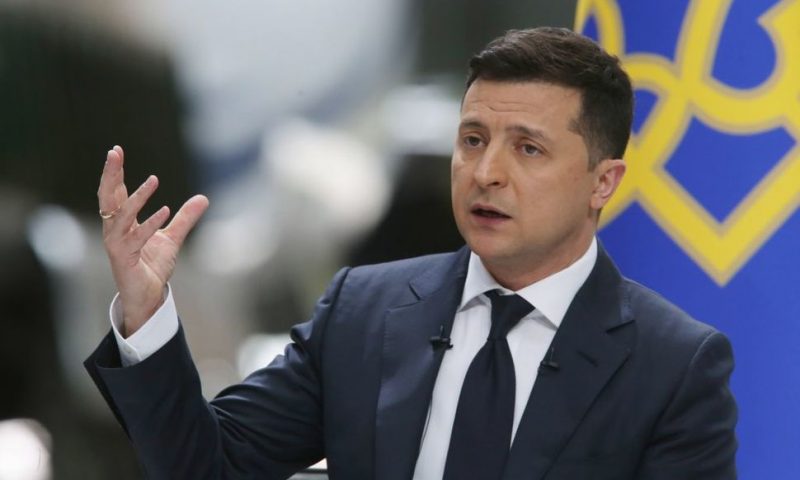A White House official justified Biden’s decision for a summit with Putin saying ‘there’s no substitute for face-to-face engagement’ moments after turning down similar pleas from Kiev.
The White House on Monday signaled it will not grant a desperate request from the president of Ukraine for a face-to-face meeting before President Joe Biden’s high-profile summit with Russian President Vladimir Putin next week, even as it touts such personal engagement as an irreplaceable form of diplomacy.
In an interview with Axios published on Sunday, Ukrainian President Volodymyr Zelenskiy expressed his urgent desire to meet with Biden “at any moment and at any spot on the planet” to discuss the increased pressure Russia has exerted on its former Soviet ally. Zelenskiy spoke after an unprecedented buildup of Russian forces along the shared border in April and weeks after Biden’s highly criticized decision to waive U.S. sanctions on a controversial Russian pipeline seen in part as a way to exert greater control over Ukraine.[
Speaking to reporters at the White House on Monday afternoon, national security adviser Jake Sullivan revealed that Biden was at that moment on the phone with Zelenskiy from the Oval Office for what he said was a previously planned call. However, he added that the president would not meet in person with his Ukrainian counterpart until after returning from a wide-ranging tour through Europe, which will include the meeting with Putin on June 16.
Biden relayed that he will “stand up firmly for Ukraine’s sovereignty, territorial integrity and its aspirations as we go forward,” Sullivan said.
That consolation, however, likely means little to Kiev, particularly as Sullivan moments before had documented the broad scope of the Biden trip that begins Thursday and boasted of the three dozen world leaders he plans to meet along the way. Biden will land first in the U.K. for a series of meetings with local leaders and will attend the summit of G-7 countries in Cornwall on Friday. From there, he’ll travel to Brussels for a NATO summit followed by another gathering between the U.S. and EU leaders. The trip ends with the Putin meeting in Geneva.
Sullivan stressed the importance of in-person meetings in justifying to reporters why Biden would grant Putin such a high-profile summit, which critics say rewards the increasingly autocratic leader at a time of troubling Russain acts of aggression worldwide.
“There’s no substitute for face-to-face engagement in any dynamic,” Sullivan said. “He will look in the eye of literally dozens of leaders over the course of his time, and all of that will be better than just operating on the telephone.”
“This isn’t something unique to Putin,” he added, citing visits to Washington by the leaders of South Korea and Japan. “Face-to-face engagement is just of a different order of magnitude of diplomatic engagement than doing it over the phone.”
Zelenskiy has spoken by phone with Biden since his inauguration, but they have not previously met in person.
In his interview with Axios, Zelenskiy expressed grave concerns about Russia’s psychological pressure campaign against Ukraine, where it has supported separatist forces in an ongoing war since 2014 when it also annexed the Crimean Peninsula. He said he was “surprised” and “disappointed” by Biden’s decision not to enforce U.S. sanctions on the Nord Stream 2 pipeline, which travels through the Baltic region into Germany, circumnavigating and isolating Ukraine.[
“This is a weapon, a real weapon … in the hands of the Russian Federation,” Zelenskiy told Axios. “It is not very understandable … that the bullets to this weapon can possibly be provided by such a great country as the United States.”
Prominent members of Congress – including Sen. Bob Menendez, New Jersey Democrat and Foreign Relations Committee chairman – have criticized Biden’s decision and questioned how it does anything but reward Russia despite its recent hacks of U.S. government servers and domestic crackdowns, including arresting noted dissident Alexei Navalny.
Analysts also believe the high-profile nature of the meeting bolsters Moscow’s image globally.
“The summit offers Russia the respect and legitimacy it craves on the world stage. Moscow still views itself as a great power, and its more aggressive foreign policy has led Russia to become more active in Africa, the Middle East, Latin America, and even the Arctic region,” private intelligence firm The Soufan Center wrote in an analysis note last week. “While many critique the summit for positioning Russia on par with the United States, it also serves as a recognition of the importance for the U.S. to more proactively engage on the foreign policy stage and actively shape key outcomes.”

